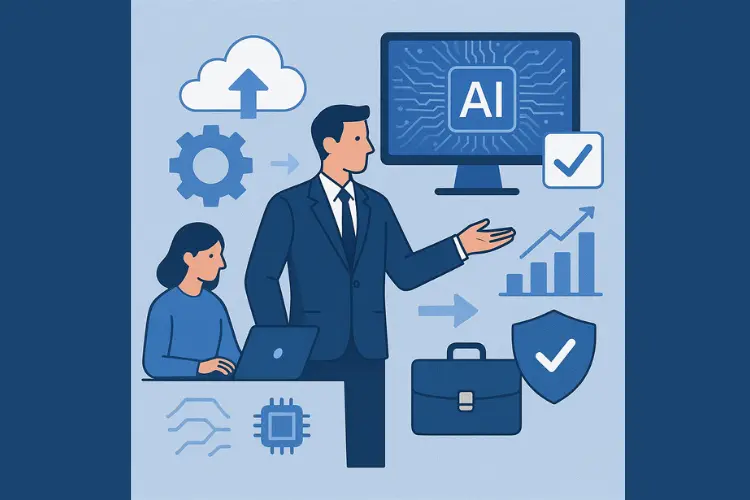Introduction
Artificial intelligence is reshaping technology and business at a record pace. Investors are pouring billions into models, chips, and data infrastructure. Yet this surge is not without conflict. Lawsuits over data and copyright continue to mount. At the same time, cloud giants are racing to control GPU compute capacity — the lifeblood of modern AI.
Microsoft’s $17.4 billion acquisition marks a turning point. This deal signals a new phase in AI infrastructure. It also highlights how legal, financial, and technical forces intersect. In this article, we break down the implications of the deal and show why every company — from startups to Fortune 500s — must pay attention.
The Explosive Growth of the AI Industry
The AI industry is expanding at double-digit rates. Analysts estimate the global market will surpass hundreds of billions within a few years. Funding for large language models and specialized chips is rising at an unprecedented speed.
Competition is fierce. Open-source models lower entry barriers, but scale still wins. Large firms dominate because they can afford massive training runs. This creates a “compute divide” between hyperscalers and smaller players.
Legal risk is also increasing. Creators and regulators are challenging how AI firms collect and use data. Copyright, privacy, and security lawsuits could shape the next decade of innovation.
Microsoft’s $17.4 Billion Acquisition Explained
Microsoft has a long history of strategic acquisitions. Its $17.4 billion AI deal strengthens its control over the infrastructure layer. The acquisition expands access to high-performance data centers and specialized chips.
With this move, Microsoft positions itself as a full-stack AI provider — from cloud services to model training platforms. It can now integrate hardware, software, and developer tools in one ecosystem.
This consolidation matters. Businesses want integrated, reliable platforms. Microsoft’s scale can reduce latency, increase security, and simplify compliance. The deal also pressures rivals such as Amazon, Google, and Meta to accelerate their own investments.
The GPU Compute Race: Who’s Winning?
Modern AI models consume massive compute resources. GPUs and custom accelerators are the new oil of the digital economy.
NVIDIA leads the market with its A-series and H-series chips. AMD and Intel are launching competitive offerings. Google builds TPUs for its own cloud. Amazon develops Trainium and Inferentia chips.
Microsoft’s deal expands its ability to secure and deploy GPUs at scale. This is critical because GPU supply is constrained. By owning infrastructure instead of renting it, Microsoft can guarantee compute for its Azure customers and internal AI teams.
For startups, the cost of GPU time can be prohibitive. This opens space for new service models. A fractional CTO offering, for instance, can help smaller companies choose the right cloud provider and optimize compute costs without hiring a full-time executive. Fractional CTOs guide early-stage teams through complex AI infrastructure decisions, enabling them to compete with larger rivals.
The Future of AI Infrastructure and Spending
AI infrastructure spending is entering a super-cycle. Cloud providers are adding data centers across continents. Telecom operators are upgrading networks for low-latency connections. Governments are funding national AI compute centers.
In this environment, companies must plan carefully. Costs for training and inference can spike as models grow. Energy use, cooling, and sustainability will also affect total cost of ownership.
Microsoft’s acquisition signals that hyperscalers see infrastructure as the ultimate moat. Owning data centers, chips, and supply chains locks in customers and margins. This could make it harder for smaller providers to compete — but it also creates opportunities for specialized services, from edge AI to security audits.
Adopting a fractional CTO model can help businesses forecast spending and avoid vendor lock-in. A seasoned fractional CTO can negotiate contracts, evaluate multi-cloud strategies, and ensure compliance with emerging regulations.
Legal and Ethical Challenges Facing AI
The surge in lawsuits reflects growing public concern. Artists, publishers, and consumers question how AI models are trained. Privacy advocates demand stricter controls on personal data. Governments explore frameworks for AI accountability.
For large players like Microsoft, legal risk is a cost of doing business. The $17.4 billion acquisition includes not just servers and chips but also compliance expertise. Integrating robust legal and ethical standards is essential to maintain trust.
For smaller firms, the stakes are higher. One lawsuit can derail a funding round. That is why legal due diligence and responsible data practices must be part of every AI roadmap. Fractional CTOs can partner with legal advisors to embed privacy and security from day one.
What This Means for Businesses and Developers
This deal sends a clear signal: the AI infrastructure race is accelerating. Compute, legal compliance, and integration are now competitive differentiators.
Businesses that rely on AI must secure reliable, cost-effective compute. They must also monitor regulatory changes. Startups can no longer treat infrastructure as a commodity. Instead, they need strategic planning.
Developers must adapt to multi-cloud environments, optimize code for different chips, and learn best practices for data governance. Partnering with experienced advisors — including fractional CTOs — can shorten the learning curve and reduce risk.

Conclusion
Microsoft’s $17.4 billion AI acquisition is more than a headline. It signals a shift in power toward companies that control the entire AI stack — from chips to compliance. The race for GPU compute will define the next phase of innovation. At the same time, lawsuits and regulations will shape how AI products are built and deployed.
For startups, this landscape is both challenging and full of opportunity. With the right guidance — such as leveraging a fractional CTO — smaller teams can navigate infrastructure costs, legal risk, and scaling challenges.
Staying informed is the key to thriving in this new era. That’s why platforms like StartupHakk focus on explaining complex technology trends and giving founders actionable insights. By understanding the forces behind deals like Microsoft’s, you can position your business for long-term success.




